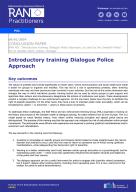Details
- Publication date
- 28 March 2024
- Author
- Directorate-General for Migration and Home Affairs
- Country
- Portugal
- RAN Publications Topic
- Community policing
- Training
Description
The nature of protests has evolved significantly in recent years. Online communication and social media have made it easier for groups to organise and mobilise. This has led to a rise in spontaneous protests, often involving individuals who may not have previously been involved in such activities. But the rise of this online dimension also changes the way in which narratives spread; framing tactics can be used by action groups to gain support and legitimise their actions and simultaneously delegitimise the actions of institutions and police.
These developments present a complex challenge for law enforcement agencies. On the one hand, police have the duty to facilitate the right of peaceful assembly. On the other hand, they have a duty to maintain public order and safety, which can be threatened by violent — or extremist — actors in these same movements.
To addresses these challenges, the RAN Police and law enforcement Working Group (POL) organised a training on the theory and practice of the Swedish model of dialogue policing, for police officers from all over Europe. This is a model based on social identity theory, from where conflict reducing principles and special police tactics are distinguished. The premise of the training was that the approach can mitigate the risk of radicalisation within protest movements. The participants were officers with experience and expertise in policing (political) manifestations and/or extremism and radicalisation.
The key elements in the training were the following:
- Investing in knowledge on specific groups and choosing tactics based on these insights lowers the risk for disorder and violence to occur (and thus the need to resort to repressive use of force) during (political) manifestations, while safeguarding the democratic right of assembly.
- Working on a better relationship (and trust) between certain groups and police is a (psychological) tool for maintaining public order — which could also (positively) influence the perception towards and legitimacy of the police and their actions.
- The dialogue approach can be a useful instrument for police to engage with (possibly violent) protesters, but it doesn’t replace other existing tactics, including more repressive ones. It is a new, extra tool in the toolbox for police to police demonstrations.

